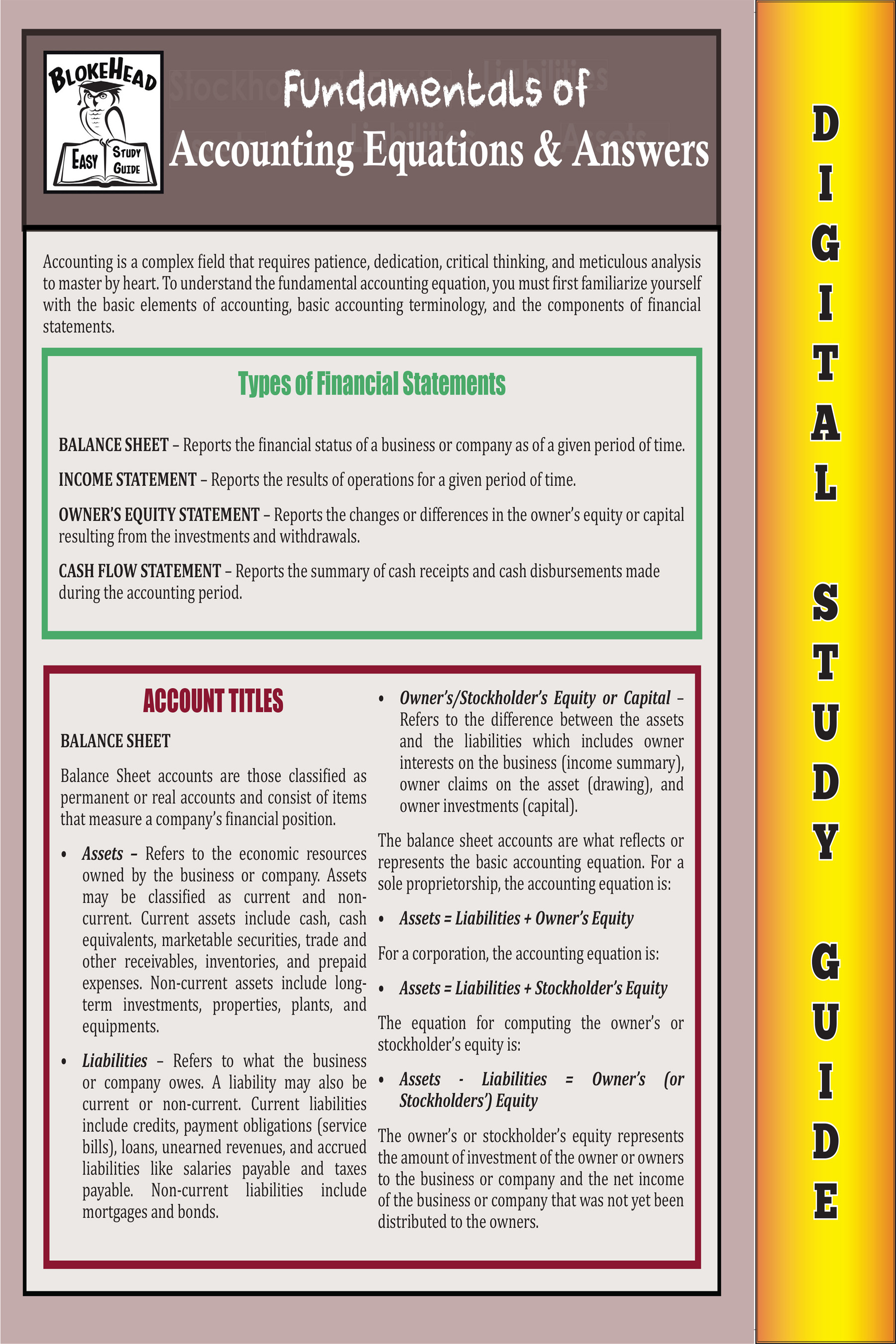Basic Accounting Study Guide
Accounting Study Guide by AccountingInfo.com. Principles of Accounting Course Review Intermediate. Simple and Compound Interest Calculations. Basic financial management study guide pdf download - financial. Basic accounting study guide - lionandcompass - 2 the purpose of this self study guide the. Basic Accounting: Service Business Study Guide is designed as a reference material in introductory accounting that can be used by readers, especially students, taking basic accounting for service business.Presentations and discussions of various accounting concepts and frameworks are simplified to provide the reader with an initial working.
UNIVERSITY OF AGDER / MAKERERE UNIVERISTY YWX 4203 Basic Financial Accounting Study Guide Course Instructor: Richard Kajumbula Course Author: Richard Kajumbula April 2015 Introduction Welcome to the course! The main objective of this course is to introduce participants to books of accounts and accounting procedures so that on completion, they have ability to prepare financial statements, prepare bank reconciliation statements and prepare and monitor budgets. The Basic Financial Accounting online course will emphasise learning as a social activity, and many learning activities are therefore mandatory collaborative. The collaboration will take place online; in a virtual learning environment created on an e-learning platform.
You have to be the active one, constructing your own knowledge, based on the learning objectives, the information given, information you find yourself and information from your peers and tutor. You are responsible for your own learning. The teacher’s role is therefore, to a large extent, guide, challenge, facilitate, give new aspects and coordinate rather than to disseminate information This study guide provides the detailed goals, tasks, activities, time plan and learning resources.
However, the most important learning resource will be the participants themselves. To make a good learning environment, you are encouraged to log in frequently, if possible daily, even if it is only for 10-15 minutes. The course is flexible, meaning that you can study anytime, anywhere. You don’t have to log in at certain hours. There are however, time limits on how much time you can spend on a task, and still keep up with the other students. Those who want to take the exam should expect to spend roughly 270 hours on this course – give or take 30% depending on your prior knowledge, experience and skills.
Your final grade in the course will be made up of assignments, quizzes and an individual final exam at the end of the course. In addition, participation in online discussions will make up 10% of your final grade. A high grade requires participation, and you have to complete 70% of the activities in order to sit for the exam. Each module describes in detail what to learn and to what level, that is, the objectives of the module. Read the objectives now and then to ensure that you actually are learning what you are supposed to learn.


Financial Accounting Study Guide Free
Assignments and exams will always try to establish whether you have achieved the objectives of the modules and the course. To complete the ‘learning events’ or ‘tasks’ (the topics to learn and understand), you and your peers are asked to do one or more learning activities. The more difficult the task is assumed to be, the more activities. After each module you should reflect on your learning process. Reflection is a deliberate, self-conscious analysis of what happened during the learning event, and is important for the process of constructing knowledge.
Reflection can be individual or collective. Be result and product oriented in the learning process! Make exhibits! When you attend a lecture or study text books, you usually make notes. In this course, collaborative work with your peers in a way replaces the lectures. You are asked to make notes, summaries or reports from your discussions instead of from the lectures.
We will try to follow this Study Guide as much as we can. However, from time to time, there might be changes and departures from the Study Guide.

These changes will be clearly conveyed to you well in advance through the LMS and email. Be sure to read the messages in the LMS regularly. Course overview Aims The course is designed to provide students with the ability to explain basic concepts of Financial Accounting and posting of accounting transactions from primary books to ledgers. Students will also be taught on Preparation and presentation of financial statements, bank reconciliation statements and budgetary control. Course goals Upon completion of this course, you should be able to;. apply the various theories and concepts of financial accounting;. prepare books of accounts, that is, journals and ledgers;.
prepare financial statements using the trial balance and other available information;. prepare bank reconciliation statements using the cashbook, bank statement and other available information;.
prepare budgetary control statements.
Accounting Resources and Guides CFI has created hundreds of guides and resources to help you learn accounting. These articles are meant to be used as self-study, so you can read and learn on your own pace. In the guides you’ll see examples and step-by-step instruction on the most important and common accounting principles and concepts required to be a world-class financial analyst. Learn Accounting Below is a list of CFI’s most popular guides to learn accounting on your own. Each guide is tailored to the point-of-view of a financial analyst, so you’ll be learning accounting with a finance perspective. Whether you need to learn about debits and credits, journal entries, the 3 financial statement, or the various types of depreciation, these guides will have you covered! Browse All Guides.
MaritzCX moderates public reviews to ensure they contain content that meet Review guidelines, such as: ‣No Profanity or inappropriate defamatory remarks ‣Fraud ‣No Personal Identifying information (e.g., customer phone number or email) ‣No Competitor references (e.g., another brand or dealership) ‣Dangerous behavior (e.g. Are reviews modified or monitored before being published? Ford fiesta 2015 owners manual.